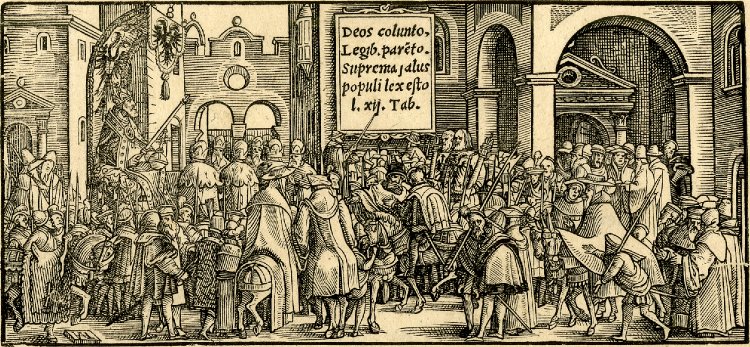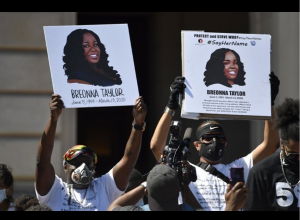In 1517, when the 95 Theses were first posted, Martin Luther had no intention of breaking from the Roman Catholic Church. Rather, he sought to reform the Church’s view on indulgences, believing that no one could buy their way into heaven. Believing that his view was deeply rooted in Scripture, he was confident that Church scholars would agree with him. Instead, the Church hierarchy responded by accusing Luther of heresy, wanting to quell any question of their authority. As a result, what was initially an effort to reform the Catholic faith eventually transformed into a major schism in Christianity itself.

Prior to sparking the Protestant movement, Martin Luther was an Augustinian monk teaching at the University of Wittenberg in Germany. In 1517, Pope Leo X sanctioned indulgences to be sold to raise money for the construction of St. Peter’s Basilica in Rome. An indulgence consisted of money given to the Church in exchange for less time in purgatory, which was conceived as a theological waiting room where imperfect souls were purified after death before they enter heaven. People essentially believed that this meant they could buy a way into heaven for themselves and their loved ones.1 As a result of the Pope’s decree, a Dominican monk, Johann Tetzel, began preaching in favor of these indulgences in the towns of Jüterbog and Zerbst near the university.2 Luther responded to this by writing to the archbishop, admonishing him by asserting that simply paying money to the Church does not purify the soul.
When his protestations went unanswered, Luther posted his 95 Theses. The theses were arguments opposing the manner in which indulgences were being sold.3 Most of the theses did not contradict Catholic doctrine, so it is widely believed that Luther wrote them to spark a theological academic debate. The theses, originally written in Latin, were translated into German and put into wide circulation; this caught the attention of Rome. Fearing that the funding for St. Peter’s Basilica was under threat, Leo ordered Luther to be investigated. In response, Luther sought the support of a Germanic prince, Frederick the Wise. Frederick granted Luther support and protection, insisting that the investigation take place in Germany.4 In response, Leo asked the papal legate in Augsburg, Cardinal Cajetan, to investigate Luther. Brought before Cajetan, Luther was asked to renounce his theses and recant his accusations against the Church. Luther refused, but agreed to stop commenting on indulgences and listen to the Church. Although this was not Cajetan’s desired result, Frederick allowed Luther to return to Wittenberg.5

The following year, 1519, Luther agreed to debate the theologian Johann Eck. Eck instigated the debate by comparing Luther’s positions to Jan Hus, a well-known heretic that had been excommunicated and executed a hundred years earlier. This forced Luther to declare that the Church had been wrong to condemn Hus, opening himself to charges of heresy.6 Eck had given the pope the opportunity to bring excommunication charges against Luther. However, the Holy Roman Emperor Charles V, not wanting to upset Frederick the Wise, forced the pope to subject Luther to a hearing at the Diet of Worms. At this time, Luther’s cause was gaining popularity among Germans. The emperor could not afford to upset the German prince, needing his support to fight an ongoing war with France and keep the Ottoman Empire from Austrian lands.7
During the trial, Luther was led into a room where his accusers had piled his works on a table, read the titles aloud, and asked if these books belonged to Luther. Luther replied that the books belonged to him. He was then asked to renounce them. Luther then asked for time to consider. When he returned the next day he refused to reject anything, saying that unless he was disproved by Scripture, he was bound by his conscience to defend his work.8 He felt that he was strongly supported by the Bible. However, Church officials saw this as a rejection of their authority rather than an appeal to Scripture. Charles V, though angered, could do nothing to condemn Luther as long as he remained at war. Instead, he planned to send Luther back to Wittenberg marked as a heretic.9 However, before he reached the university, Frederick the Wise secretly had Luther taken to Wartburg Castle.10
Throughout the next few years, Luther continued to defend his works. One of his biggest achievement during this time was the translation of the Bible from Latin into German. Still, he was forced to remain hidden. Charles V, after securing an alliance with the pope in the war against France, no longer needed ties with Frederick the Wise. This allowed the papal bull, proclaiming Luther’s excommunication, to be issued, adding a decree which ordered that no one give Luther refuge.11 It was ultimately his refusal to retract his works that prevented Luther from reforming the Church. Pope Leo X, Charles V, and other high Church officials perceived Luther’s passion for reform as a challenge to authority. In contrast, Luther believed that his works were strongly supported in Scripture. The miscommunication and stubbornness of both parties ultimately led to a major schism within Christianity. When the Church labeled him a heretic, Luther had no choice but to begin his own branch of Christianity, Lutheranism, so that he could continue to practice the faith to which he had dedicated his life.
- Renaissance and Reformation Reference Library, July 2002, s.v. “Martin Luther: Founder of Lutheranism” edited by Julie L. Carnegie. ↵
- New Catholic Encyclopedia, September 2003, s.v. “Luther, Martin” by Bill Ditewig. ↵
- Funk and Wagnalls New World Encyclopedia, 2016, s.v. “Luther, Martin” ↵
- Renaissance and Reformation Reference Library, July 2002, s.v. “Martin Luther: Founder of Lutheranism” edited by Julie L. Carnegie. ↵
- New Catholic Encyclopedia, September 2003, s.v. “Luther, Martin” by Bill Ditewig. ↵
- Renaissance and Reformation Reference Library, July 2002, s.v. “Martin Luther: Founder of Lutheranism” edited by Julie L. Carnegie. ↵
- Renaissance and Reformation Reference Library, July 2002, s.v. “Martin Luther: Founder of Lutheranism” edited by Julie L. Carnegie. ↵
- Encyclopedia of World Biography, December 2004, s.v. “Martin Luther,” by Andrea Henderson. ↵
- Julius Koestlin, Life of Luther (Project Gutenberg Literary Archive Foundation, 2006), 105-116. ↵
- Funk and Wagnalls New World Encyclopedia, 2016, s.v. “Luther, Martin” ↵
- Julius Koestlin, Life of Luther (Project Gutenberg Literary Archive Foundation, 2006), 105-116. ↵



94 comments
Damian Jennings
Martin Luther did what many people would have feared to do, and that was to voice his opinion, whether it was popular or not it arose conflict in the Christian community and for that he paid with his life. I am not much of a historical reader but this was a very good topic and very informative!
Jabnel Ibarra
The plight of Martin Luther is an important reminder of why being reflective and self-critical is absolutely important for any individual or organization. The Catholic church had lost its way and was directly conflicting the values of which it preached when it decided to sell indulgences to the public. The fact that Luther was ostracized for protesting this is absolutely despicable of the church.
Esperanza Rojas
This article was filled many facts I didn’t know, such as that Luther still wanted to be part of the church, I always figured the 95 Thesis was to make people break away from the Church. There were somethings that I believed should have been added in the article. The author could’ve explained more of the vocabulary terms that not many people would know right off the bat, such as “Scripture” and “Augustinian” .
Lorenzo Rivera
Martin Luther being accused for trying to fix the church just showed how easily corrupted the church can become. He attempted to do good in the name of his religion and was punished by those in power. Martin Luther was unfairly treated, yet he continued to practice faith and unintentionally created a new form of Christianity. The article gave an interesting point by saying that Martin Luther may not have wanted to break from the church, and that is intriguing.
Rafael Lopez-Rodriguez
Usually most people will tell you that Martin Luther was a bad guy in the eyes of the catholic church. He just disagreed with some ideals that the church proclaimed. I find ironic how the church forced people in what to believe in at the time. It is good that Luther stood up for what he believed in and fought for it. I have to admit the church throughout history has played as the “bad guy” in some cases.
Maria Esquivel
In high school, I only new the basic details about Martin Luther and about the 95 theses but that was about it. I was surprised to find out that Martin Luther did not want to break from the Catholic Church but that he was only trying to reform it. I really enjoyed reading this article because I didn’t know why Martin Luther had his own branch of Christianity but now I do and I think he made a good decision of not being influenced to renounce his work.
Tyler Sleeter
Great article with lots of information. I like how you explain in chronological order the events that occurred leading up to Luther’s excommunication from the Church. I was surprised to see that it took so long to excommunicate him since the Church condemned him early on. It is a shame that Luther was not able to get the Church too see the problem with selling dispensations so that he could remain with the Church. It is horrible to me that the Church allowed such things to happen and then punished Luther when he pointed out the atrocity.
Fumei P.
This article mentions Frederick the Wise serveral times, but gives no description of who he is. If anyone else is curious, I looked him up and his name is Frederick III also known as Frederick the Wise, he was Elector of Saxony, Duke of Bavaria. According to Wikipedia him and Luther were close friends, and Luther’s biggest supporter. I liked that this article highlighted Luther as the protagonist, he had some serious guts for calling out the Catholic Church.
Samuel Ruiz
This article caught me by surprise. I learned more than I expected due to my honestly centered view on the Catholic faith as opposed to the origins of the Lutheran church. I did not even know that Martin Luther’s intention was actually not to break from the Catholic Church nor cause a reform. Additionally, I had never heard of the early teaching of paying your way into Heaven. If I understand correctly, the Church no longer practices it but I was surprised to come across this old reality for early Catholics.
Auroara-Juhl Nikkels
I first heard of Martin Luther during my senior year in high school in my European history class, but growing up my grandmother always told me we were Lutheran. I was always a bit curious why there are different denominations of the Christian religion. Your article was very well written and I love the fact that you continued to point out that Luther did not want to break free of the Church but reform the church.